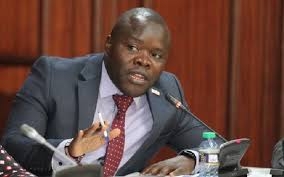This week, I spent time with student leaders from a number of universities and colleges from the lake region.
The meeting sought to enhance the student leadership capacity to build strong movements that can advocate for their fellow students' wellbeing. Further, the training aimed to enhance the student leaders' knowledge of freedom of expression and access to information.
In recent times, there has been a noticeable decline in the strength and influence of the student leadership movement in Kenya. Their voices have not been heard in national discourse. Unlike in the past, we no longer see representation of students even on matters that affect them.
The introduction of the University Amendment Bill by current Defence Cabinet Secretary Aden Duale has further weakened this essential pillar of societal transformation.
As a former student leader, I was disappointed at the level of hopelessness, the lack of mentorship and low energy levels that the student leaders that I met oozed. It is without a doubt that the once very vibrant movement of student leadership is dying, if not already dead.
With this sad situation then, one is left to wonder, who speaks and/or represent more than 540,000 university students and more than 200,000 students in TVETs in national conversations?
Looking back at the history of student leaders who have risen against injustices, it becomes evident that a strong student movement is vital for fostering a more robust and visionary national leadership.
By referencing previous student leaders, we can recognise the immense potential that lies within the student community to drive positive change and shape the future of our nation.
The student leadership movement in Kenya has a rich history deeply intertwined with the struggle for independence and subsequent national development.
From the iconic student protests against colonial rule to the pivotal role students played during the push for multiparty democracy in the 1990s, students have consistently demonstrated a strong commitment to justice, human rights and good governance.
Through their activism, they have acted as vanguards for societal progress. They have fearlessly confronted injustices, championed the rights of the marginalised and challenged oppressive systems.
Some of these leaders, such as Miguna Miguna, Kiraitu Murungi and Omar Hassan, went on to become influential national figures who continue to shape the political landscape of Kenya.
To realise their full potential as agents of change, student leaders need a platform that amplifies their voices and coordinates their efforts effectively. This is where student unions play a vital role.
Historically, student unions have been instrumental in fostering unity and providing a collective voice for students. They have advocated for improved educational policies, enhanced student welfare and social justice, both within universities and at the national level.
The above platforms should be supported by the government and civil society actors. They should, however, not be interfered with by the government.
Student unions have also served as training grounds for future leaders, nurturing essential leadership skills, fostering critical thinking and encouraging civic engagement. These unions have produced remarkable leaders in the corporate, political and civil society fields. My passion to work in the civil society was in a huge part shaped during my days as a student leader.
Unfortunately, the strength and influence of student unions have waned in recent years.
The University Amendment Bill serves as a prime example of legislation that seeks to limit the autonomy and suppress the power of student unions. If passed, this Bill would undermine the ability of student leaders to address critical issues affecting the student body and society at large.
Moreover, several challenges have contributed to the weakening of the student movement. These include increasing commercialisation of education, limited student representation in decision-making agencies and apathy among students.
These factors have eroded the collective spirit and unity that once defined the student movement, hindering its ability to effect meaningful change.
To ensure a stronger national leadership in the future, it is imperative that we revitalise the student movement and empower student leaders. By actively engaging in matters of national importance, student leaders bring fresh perspectives, idealism and a genuine concern for the common good.
It is, therefore, time for the government, civil society organisations and other actors to rebuild the student movements by encouraging their existence, building their capacities and providing mentorship.
Senior programme officer at Article 19 Eastern Africa
















